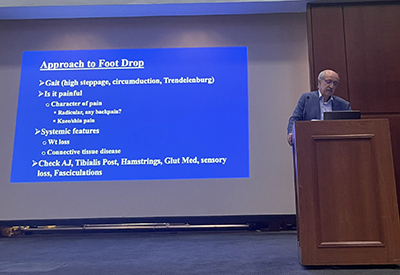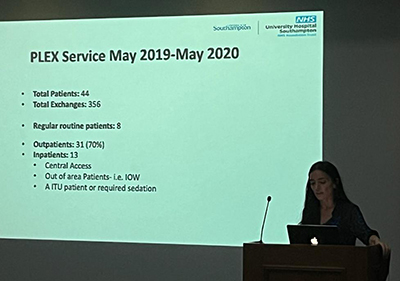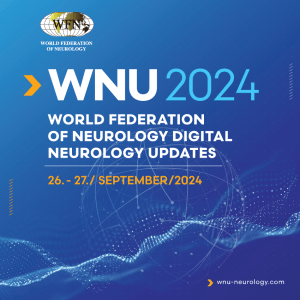The South of England Neurosciences Association
Established in 1984 by Dr. John Rees, the Society of Neurology Associates (SENA) has consistently aimed to foster professional connections among members across the entire neuroscience community. The association organizes biannual clinical neuroscience meetings, rotating among hospitals within SENA’s geographic scope that house neuroscience centres. These gatherings, typically sponsored by pharmaceutical companies, feature representatives sharing the latest innovations without influencing the meeting agenda or sponsoring speakers. Local neuroscientists deliver lectures, concluding with a registrar case presentation competition, followed by a relaxed social dinner.
SENA meetings have received endorsement from the Federation of Royal Colleges for 6 CPD credits in category 1 and remain complimentary to attend. The transition from the conventional face-to-face arrangement to a hybrid system amid the COVID pandemic has allowed the meetings to persist throughout the crisis, guaranteeing ongoing access to valuable learning opportunities.
The Autumn session of the biannual SENA conference in 2023 convened at the Winchester Guildhall, located in Winchester, England, the nation’s historical capital. The organization of this conference was spearheaded by University Hospitals Southampton. Marking a significant milestone, this event represented the first in-person meeting since the onset of the pandemic, with tickets selling out within a day of its announcement, underscoring the widespread popularity of SENA conferences.
Building upon the triumph of the preceding gathering, the event leveraged the Event Leaf app to streamline delegate experiences, providing easy access to the program agenda, registration processes, and question submissions. Dr. Matt Harris and Professor Raad Shakir, the current president of SENA, jointly delivered the opening address, extending a warm welcome to all participants. The initial block of talks during the conference was chaired by Dr. Chinar Osman.

Dr. Haider Katifi led the commencement of the clinical discussions, focusing on unusual neuropathies and offering practical clinical insights applicable to neurologists in clinical practice. Particularly noteworthy were the clinical pearls extracted from his exploration of foot drop, encompassing its diverse etiologies and the intricacies of the localization process.
In the subsequent presentation, Professor Diederik Bulters, a distinguished vascular neurosurgeon, provided a comprehensive overview of cranial dural arteriovenous fistulas. Drawing insights from the CONDOR consortium, an international registry encompassing patients with this condition, Professor Bulters shared valuable data on various aspects, including clinical presentations, investigative methodologies, classifications, and potential management options related to cranial dural arteriovenous fistulas.
Following that, Dr. Julian Furby delivered a comprehensive discussion on Multiple Sclerosis, offering practical insights customized for a General Neurology clinic. His presentation included a detailed overview of imaging techniques and recommended time intervals for the follow-up of patients with multiple sclerosis. Furthermore, Dr. Furby introduced the audience to the latest disease-modifying agents now available for the management of primary progressive and secondary progressive Multiple Sclerosis.
The trajectory of the talks shifted as Professor Christopher Kipps presented research updates from the Wessex Neurosciences Centre. He delved into the utilization of perfusion imaging and inflammatory biomarkers for detecting early dementia processes. Professor Kipps also provided insights into the ongoing ROAR study (Risk of Aneurysm Rupture) and explored the potential of haptoglobin as a therapeutic option in the context of subarachnoid haemorrhage. The potential for blood-brain barrier disruption in the pathogenesis of Multiple Sclerosis is also being investigated.
Continuing the discourse, Dr. Lucy Kinton provided updates on epilepsy treatment and highlighted MHRA guidance concerning valproate. Alongside an overview of current antiepileptic drugs, Dr. Kinton discussed teratogenic potential, adverse effects, and indications. She also shed light on the nuanced process of utilizing valproate for seizures in men, considering evidence suggesting its potential impact on fertility. Notably, Dr. Kinton touched upon fenfluramine, initially used as an appetite suppressant and later banned due to adverse effects. Despite its history, fenfluramine has made a resurgence as an adjunctive antiepileptic drug, as explained by Dr. Kinton.
Addressing the challenges posed by Atypical Parkinsonian Syndrome, Dr. Boyd Ghosh elucidated the available pathways to ensure optimal care for patients with chronic neurodegenerative conditions. Dr. Ghosh provided insights into the complexities of distinguishing and managing these conditions, emphasizing the importance of recognizing subtle clinical nuances. As an example, he highlighted the flexion deformity of a person’s hand in corticobasal syndrome, emphasizing its potential to cause fingernails to breach the skin and lead to serious infections—a detail often overlooked but significant for the patient’s well-being.
In the dynamic field of stroke medicine, Dr. Richard Marigold provided an informative update on therapeutic advancements and evidence-based guidelines, centering on the revised National Guidelines as of April 2023. A noteworthy aspect of this update was the integration of delayed thrombolysis within nine hours of stroke onset, informed by CT perfusion scanning. Dr. Marigold emphasized the importance of these breakthroughs in stroke treatment, highlighting their alignment with current evidence-based protocols. Additionally, the audience was captivated by Southampton’s adoption of a new prehospital video triage for strokes.

In an innovative service development presentation, Dr. Chinar Osman introduced the UK’s pioneering neurology-led outpatient peripheral plasma exchange unit at Southampton General Hospital. This facility proudly stands as the sole neurology department-operated Plasma Exchange unit in the country, a visionary project spearheaded by Dr. Osman. During the presentation, Dr. Osman detailed the advantages of this initiative, including its positive impact on the trust’s income and its cost-effectiveness compared to IVIg. Moreover, he highlighted the user-friendly nature of this approach, supported by a patient satisfaction survey on Plasma Exchange.
Dr. Osman provided insights into the process of peripheral plasma exchange, shedding light on its innovative aspects. This groundbreaking approach opens the door to the possibility of conducting the procedure as a day case, providing numerous patients with both convenience and long-term economic benefits for the NHS.
The day culminated in the highly anticipated registrar case presentation competition, where Dr. Albert Joseph from the Royal London Hospital secured the first prize, and Dr. Sunjay Parmer from the Royal Free Hospital earned the second prize.
Following the closing remarks, the festivities continued with a delightful social dinner hosted at the ‘Inn the Park’ restaurant, conveniently located near the Guildhall, providing a perfect conclusion to the day’s events.

